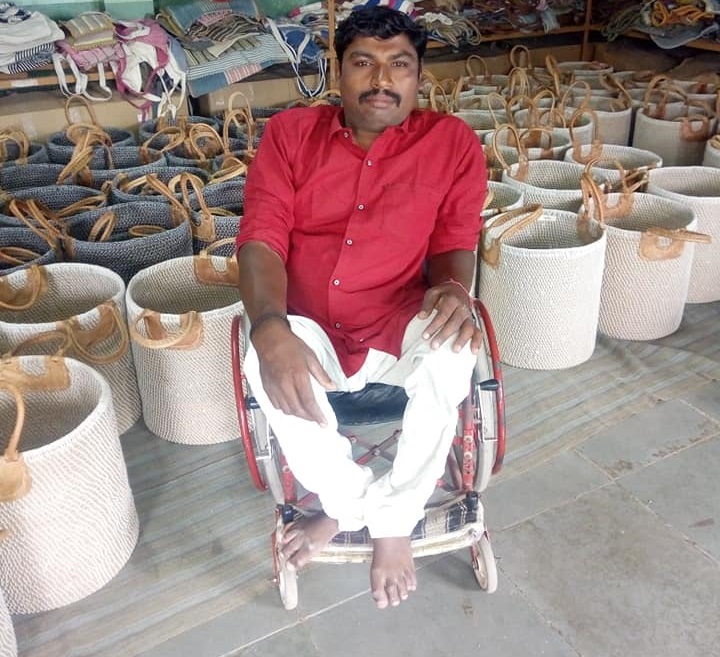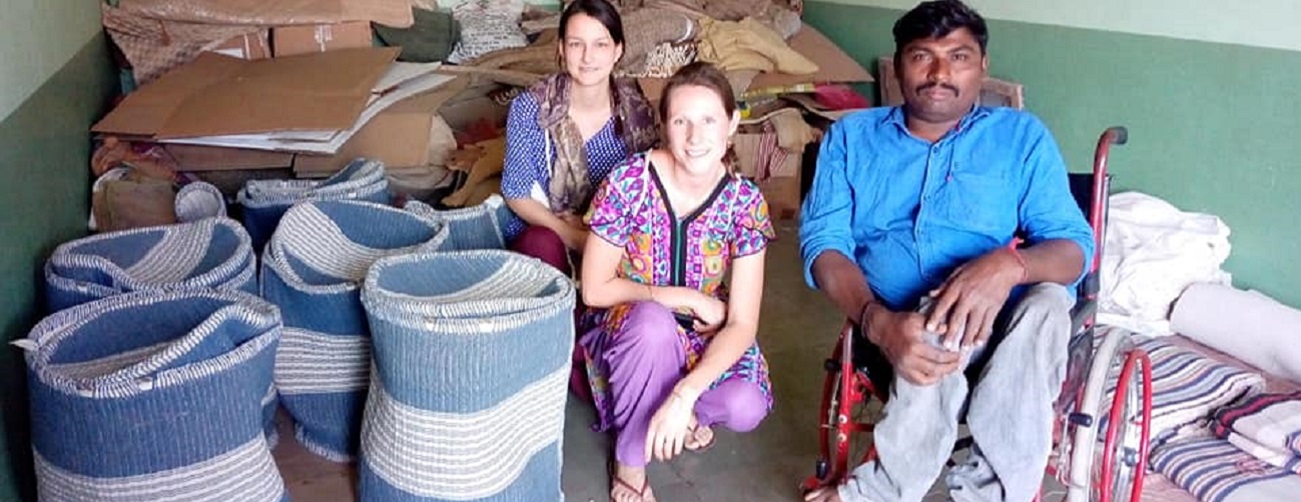It is the story of Dastagirsab Jamadar (38 yrs) a physically challenged former employee of Gram Panchayet from Belgaum, Karanataka who created an ecosystem for the handicraft economy to survive in the drought-prone regions of Karnataka. Dastagir is the manager of Unnati Handicrafts- an organisation that has nurtured the women to revive and master many of Northern Karnataka’s craft-traditions and techniques.
History of Work

The work started with a few artisans of a small tribal village in 2001 and slowly they inspired 25 surrounding villages who approached the team to replicate it in their villages. SHGs were formed in these 25 villages and programs were designed where people could be actively engaged and earn through weaving, dyeing, stitching, spinning, etc. In this way Unnati Handicrafts (formerly known as Mittan) was formed as a for-profit organisation by Shramik Abhivrudhi Sangh, a local NGO. Mr. Gopi Krishna and Fr. Joe Chanakal Kristina from Unnati Handicrafts worked with the women artisans’ community such as: indigo dyeing of the Neelgars, rope-twisting, folk-stitching and joinery of the Nadafs, vegetable tanning/dyeing of hides and leather-crafting of the Dhor and Samgar communities, wool-felting, spinning and kambal weaving techniques of sheepherding communities. Mr. Dastagir joined Unnati Handicrafts team as a labourer and started learning quality control, documentation, and product designing, coding etc. under the supervision of Mr. Gopi Krishna and took over the management of the organisation.
There was a need to find a market to survive and sustain these communities and their livelihoods. The women were taught to weave and in order to face the competition from other weavers, distinct fabrics made with jute and cotton were used. In addition, attempts were made to evolve products from the region using different techniques, different raw materials, dyeing processes, techniques were used; products made such as bags, sarees, and jewelry.
Dastagir Jamadar – Manager of Unnati Handicrafts
With the progress Unnati Handicrafts became a collective of 400 craftswomen from Rajankatti, Makelmardi, Kadoli, Hunnur, Telaganatti, Madanbhavi, and Chikoppa which are drought prone regions in the state of Karnataka. The craftswomen started earning a livelihood by making high quality, naturally-dyed, hand spun, hand woven and non-woven bags from the natural fibres of jute, cotton, mestha fibre, leather, and blended fabrics.
With a production capacity of 3000 bags per month, Unnati Handicrafts, with its distinct product-range, has carved a niche into the regional and national market in a way that nourishes the local environment and community. Unnati handicrafts participated in many national and international trade fairs and finally Dastagir got approval for IEC export license also and Unnati Handicrafts started exporting the products to USA, UK, Germany and other countries.
Today, Unnati Handicrafts is primarily known for bags (200+ designs) and baskets which are very distinct and unique.
Organisational Shift
Unnati Handicrafts shifted from being SHG to NGO to now a producer company. Work done is more at the ecosystem level. There is an attempt to create an ecosystem for the handicraft economy to survive.
Background of the Artisans
Currently Dastagir works with 43 women artisans (6 SHGs) who had previously depended upon seasonal wage labour and migration to cities for work. Some artisans are physically challenged. Their annual savings is approx. Rs. 80,000 to Rs. 1,000,00.
Women artisans of Unnati Handicrafts Photo Source: D’source
Other Social Works
Along with the craft-based sustainable livelihood projects Mr. Dastagir also works for the welfare of the physically challenged people of his village and neighbouring villages. He provides different Govt. aids and appliances provided free of cost to the disabled people like sending tricycle, wheel chair, walkers, crutches etc.
Challenges
- Indian banknote demonetisation in 2016 and GST application affected the work of Unnati Handicrafts.
- The organisation offers Rs. 3000-Rs. 4000 per month to each artisan. It became difficult for the organisation to offer sufficient stipend to its workers and so the organisation stated losing labourers.
- Covid lockdown also hampered the ability of the organisation to invest for the raw materials.
Future Plan
Dastigir wants to get more artisans to get involved with the Unnati Handicrafts and to get them certified with the export training by the Domestic International Sales Corporation (DISC).
Areas of work
14 districts of Karnataka with tribals and pastoralists
Products & The Making Process
Products include home décor, furnishings, baskets bags, jewellery, and accessories.
The product making starts with the weaving of Hybrid of Jute Cotton fabrics. In jute cotton fabric, jute is used in horizontal fashion (in shuttles of loom) to hide the roughness, and to give a detailed finish through cotton thread overlaying. Jute cotton fabric is in more demand because cotton can be easily dyed in numerous colour options and fine smooth textures feel.
Check out the yoga mats and yoga props made by Unnati Handicrafts HERE.
Check out an interview with Dastagirsab Jamadar by 547 AND 548 PRODUCTIONS HERE.
Source:
Unnati Handicrafts












